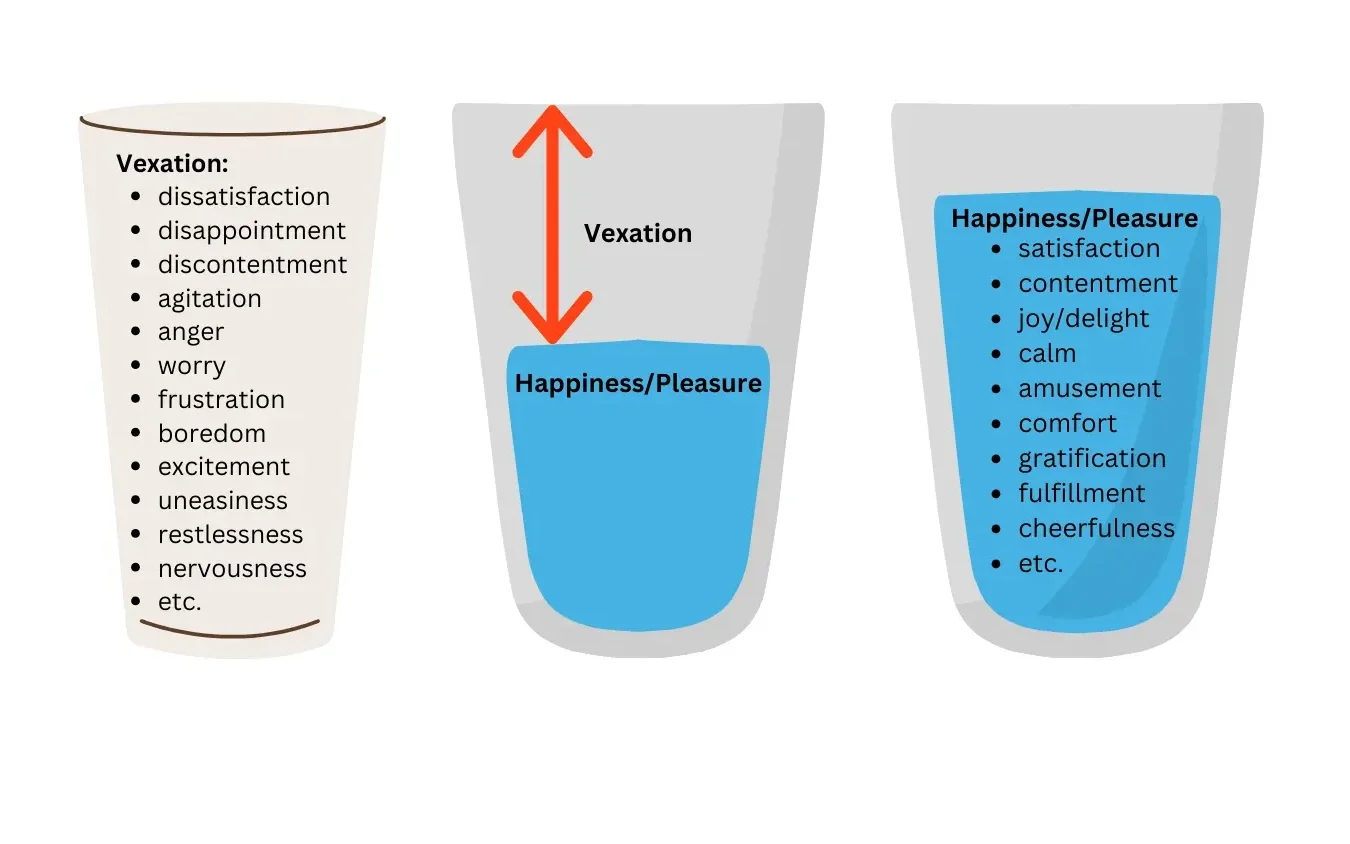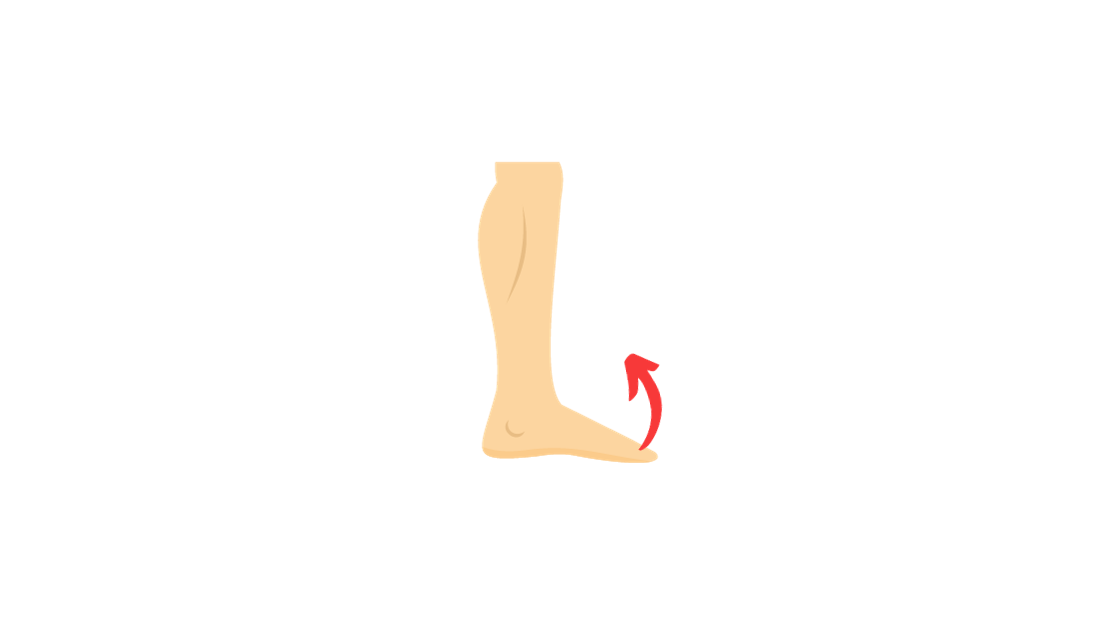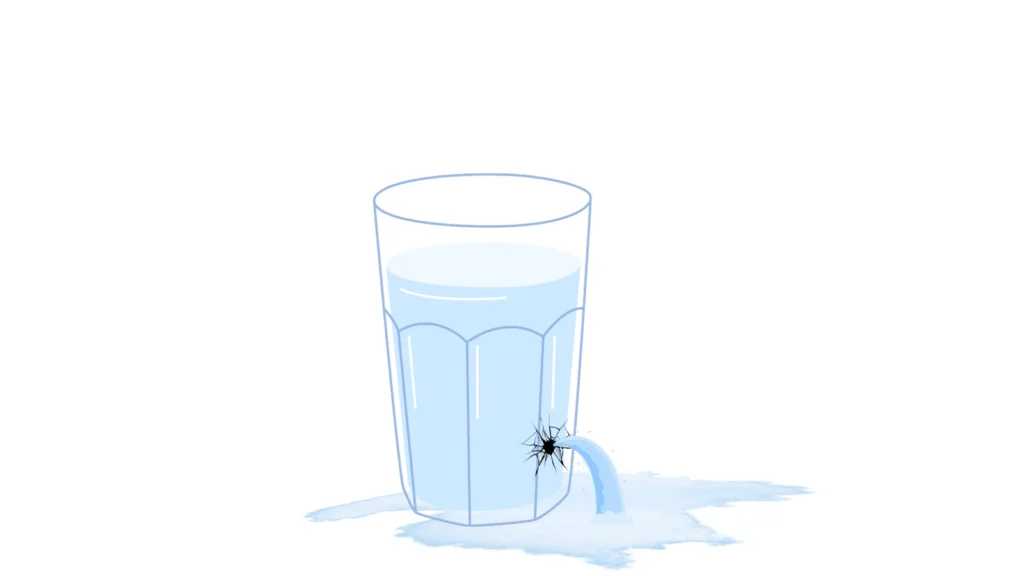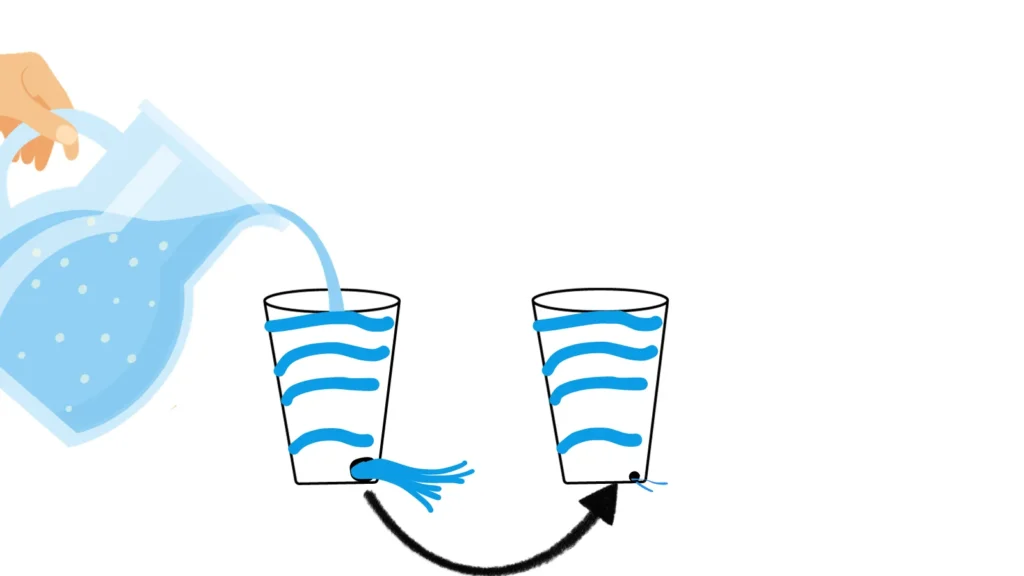Is Your Happiness a Leaky Glass?
Are you still on the quest for fulfillment, believing it resides in people, things, or your circumstances? Or is happiness your default state?
Being truly happy and dependent on your external environment at the same time is simply not possible. Here’s why:
Your surroundings always need to be a certain way for you to be happy. If any aspect falls short of your expectations, your happiness is affected. Therefore, you find yourself consistently making an effort to align everything accordingly.
So, are you then truly happy, or are you trying to be happy?
It’s as if you constantly try to fill up a glass. When it’s full, you feel content. But all the while, unknowingly, it leaks, leading to an ongoing effort to refill it. Despite your persistent attempts, have you ever succeeded in completely filling it?
The answer is no, because every day, you find yourself trying once again. No matter whether you’re rich or poor, tall or short, healthy or unhealthy, or feel loved or not loved, you are still trying.
Unfortunately, this glass cannot be filled; the nature of conditional happiness is such.
Now, is there anything wrong with acquiring material wealth, fostering close relationships, and shaping your environment? Absolutely not. You don’t need to give up on anything.
But just imagine…
…what if your happiness was not dependent on any of these things? What if you could be happy and blissful no matter what?
In this article, we’ll delve into why this “glass of happiness” can never be actually filled and take one step closer to the realization that is necessary for developing unconditional happiness.
The glass of “fulfillment”
In the image below, we’ll take a glass and divide it into two parts: an empty part and a filled part. The empty segment symbolizes any form of vexation or dissatisfaction, while the filled part, at least for the moment (but with further details to be explored), signifies a pleasurable feeling associated with happiness.

Notice how excitement is placed in the empty part. We’ve explained this thoroughly in The Happiness Paradox. Although excitement may seem pleasurable at first glance, it’s not genuinely so. The seeming positivity comes from your mind focusing on the desired outcome, expecting to achieve it.
However, when the expected outcome doesn’t materialize, the true nature of excitement is revealed as discomfort sets in. If it were inherently pleasurable, that joy should persist or even grow as the excitement continues over time.
Think about it like planning a holiday. Throughout the entire process, you might feel really excited. You’ll express how eager you are to go, making it seem very enjoyable. But what if circumstances force you to postpone the trip by a month, six months, or even a whole year? How does that make you feel now?
The longer the wait, the more frustrated you become. Going on that trip becomes a necessity for true contentment. In reality, the joy you feel by going on this trip is a relief from the frustration you experienced while eagerly anticipating it. Without that relief, you wouldn’t experience that happiness. Remember, pleasure is simply the relief of frustration, a mental fabrication that doesn’t actually exist in the external world. It only emerges when you get something you desire. Wanting something to feel satisfied implies you’re in a less satisfied or dissatisfied state by definition.
The pursuit of satisfying your senses or finding gratification is never pleasurable. If it were, you could search endlessly for something without finding it and still be ecstatic. Consider losing your keys. You wouldn’t even start searching if there wasn’t a chance of finding them. Would you be jumping for joy after an hour of searching without success?
While searching for your keys, you might still find some pleasure unexpectedly. For instance, discovering money or a precious item you lost a long time ago could bring unexpected joy. Even though you didn’t anticipate finding anything, their perceived value fulfills one of your desires nonetheless, making you feel better to some extent.
Now, let’s connect this to our glass analogy, which can explain how all forms of pleasure arise. When put all of these pleasurable feelings together, we perceive they contribute to our overall happiness. To simplify, let’s focus on a single glass representing a specific frustration and the corresponding pleasure at a time. In reality, you have more than one glass, but there’s no need to complicate things.
Finally going on vacation
When the desire for a vacation arises, your mental “glass” starts emptying, indicating a sense of vexation. The emptiness symbolizes the discontent in your mind. As long as you believe that the vacation is necessary for your happiness, you must address this emptiness by filling the glass.
This motivates your effort to go on vacation. Interestingly, without this desire, you wouldn’t be in a state of vexation. However, now that the desire exists, the mind must relieve itself of this vexation, which manifests through your thoughts and feelings.
In “The Happiness Paradox,” we highlighted that wanting specific experiences related to sights, sounds, smells, tastes, physical sensations, and thoughts tied to these sensory stimuli is inherently vexatious. It automatically places you in a state of discontent. A relief from this discontent is now only achievable by obtaining what you desire. That is, until you realize the true nature of this process and your happiness starts becoming less dependant on these sensory inputs.
So, when you eventually embark on that holiday, the previously empty glass gets filled. Now, you begin to feel pleasure and joy as your vexation gets alleviated. Someone who has no desire for a holiday won’t experience this pleasure because there’s no corresponding vexation to alleviate. If a person prefers staying at home, he would actually start vexing upon leaving it, and the only way to reduce that vexation is to return home.

An old boss from my college years is a perfect example of how a holiday can temporarily ease vexation. He used to be notoriously naggy at work, not making him popular among colleagues. Every summer, he would go on vacation with his family. After coming back, he’d be noticeably more patient and cheerful, but the nagging tendencies would gradually resurface over the next few months. This pattern persisted year after year.
He always longed for another vacation; one time was never enough. If it brought him happiness, why didn’t that happiness stay with him?
And you also want to go on vacation again, don’t you? Honestly, has one time ever been enough for you? Where does that happiness go each time and why do you need to get it back each and every time?
This means the glass doesn’t stay full; you never truly satisfy yourself.
If you can’t satisfy yourself then how can we go on and say that this or that thing can make us happy?
It’s because we’re only suppressing vexation, not eliminating it. We can’t find true satisfaction because we’re trying to extract it from something that doesn’t hold it in the first place.
Fulfillment is not an external pleasure
Observing the glass images so far, it might appear that external factors are genuinely bringing in pleasure. The water seems to symbolize enjoyable things. So, can external things really bring happiness?
No.
Here’s what’s actually happening:
External input eases vexation by temporarily filling the emptiness or void. Once that void is filled, there’s no more emptiness, leading to a positive feeling. Understanding this is crucial for reshaping your perception of happiness, so let’s explore this further.
That’s why water tastes better when you’re thirstier, and plain food becomes more satisfying when you’re starving. You swiftly transition from a highly vexed state to relief from that discomfort or uneasiness.
When the glass fills, vexation is alleviated, and the accompanying desire is temporarily satisfied. This relief from vexation is what makes you feel good and, if you experience it frequently, you’ll feel it significantly contributes to overall happiness. Unfortunately, you can never be truly happy when vexation keeps resurfacing. You’re not doing anything besides treating the symptoms.
Scratching a rash temporarily relieves the itch, but unless you address the rash itself, you’ll have to repeat the process again and again. Each scratch provides relief, akin to filling up the “glass.” However, the itch returns, the glass empties, and you’re stuck in a continuous cycle.
With your five senses and your mind, you experience the world around you. Mere experience isn’t enough, though. You have specific preferences for what you want to see, hear, taste, smell, and touch. To simplify, you could envision having a glass for each sense.
Take sound, for instance.
What music do you prefer? Beethoven or Metallica? Britney Spears or U2? Not everything satisfies you; you have distinct preferences. Your glass is only filled by listening to music you enjoy.
Yet, you can’t listen to it all the time. Sometimes you’ve had your “fill,” right? This expression is very fitting because, when your glass is full, you stop pursuing that particular input. Your desire is fulfilled, and the corresponding vexation is relieved.
How can your feelings change when exposed to the exact same thing?
Consider this: when you listen to the same songs on different occasions, do you consistently feel the same? Is the pleasure always at the same level?
That’s not possible.
At times, you may feel more joyful, and on other occasions, less so, even when listening to the exact same song. If the song could genuinely make you feel good, then how is it possible to experience different feelings?
It’s because the song doesn’t actually “make” you feel good. There’s no inherent pleasure in the song; your experience is entirely a perception of the mind. Your mind creates a feeling that doesn’t exist in the song or anything else in the outside world.
When your mind, in a state of vexation, finds a way to relieve that vexation, you experience joy because the unpleasantness is gone.

It’s like having a cramp in your calf muscle. Lifting your toes and stretching the muscles provides relief. That feels fantastic, right? Now, what if you lift your foot and stretch when there’s no discomfort? The good feeling isn’t there unless there is some pain or discomfort beforehand. Try it out.
There’s no inherent pleasure in anything, including music. Let’s apply this to our analogy.
Broken earphones
Consider a scenario where, every day, you enjoy your favorite music during your commute to work or school. Suddenly, your earphones break down. You take them to the shop, and they need to be sent back to the factory. It will take a whole week before you get them back. Darn!
Now, you desire to listen to your favorite tunes on your way to work, but you can’t, and you don’t have a spare pair.
Since you want to listen to your music but can’t, vexation builds up. Not everyone among your fellow passengers faces the same issue; they don’t share your desire. Perhaps they prefer reading a newspaper. If they couldn’t read, they would feel vexed. Those wanting to look outside would not fully relieve their vexation if they couldn’t get a suitable window seat, and someone feeling tired would vex if they couldn’t find a seat.
In your case, the only way to find relief from this specific vexation is to listen to your music. You could read the newspaper or gaze outside during your commute to distract yourself, but that wouldn’t alleviate your “musical vexation.” It might offer some relief, given your various desires in need of fulfillment. However, if your desire for music is stronger, the pleasure won’t be the same because less vexation is being relieved. Therefore, you’ll experience relatively less pleasure.
The pleasure you feel is directly proportional to the amount of vexation you’re relieved from. This further emphasizes why pleasure cannot be found in something external.
More relief is more pleasure
Upon finally getting your earphones back and playing your music again, you’ll find a stronger sense of pleasure because more vexation has been relieved.

The glass on the left might represent how you generally feel before playing your music. However, after that one week without your earphones, when you start listening again for the first time, the glass fills a larger void than usual, and you feel very satisfied, more so than usual.
During the week your earphones were broken, the vexation was stronger. We can compare this to the glass on the right, which is emptier. So when that empty glass got filled up, i.e. when that deeper vexation got relieved, the accompanying pleasure felt stronger, even though the music was exactly the same!
It’s crucial to recognize that pleasure cannot actually come from the music. This is why we can’t “add pleasure to the glass.” We can only “fill the void.” The filling of the void is felt as pleasure, not the external thing itself we’re trying to derive happiness from.
Consider the following: If the music you listen to truly has the capacity to bring pleasure, it should naturally be able to do that for anyone and under any circumstances.
This view leads to inconsistencies.
If the music were truly capable of bringing pleasure, you wouldn’t eventually get fed up with it. Once the vexation is relieved, you’d be satisfied, and now you’d move on to fill another empty glass. Perhaps now you want to socialize, and you’d feel uneasy if you weren’t going to do that.
The glass is always leaking
It’s crucial to understand that your engagement with certain activities, like listening to music, won’t be a one-time occurrence. The next day or whenever that vexation returns, you’ll want to enjoy your music again. This implies that the glass gradually empties over time. The speed of this emptying depends on the type of vexation you’re experiencing – it can be relatively quick or slow. For example, your desire to experience certain flavors of food will surface more frequently than the longing to go on vacation. The same is true for music if you enjoy listening to it regularly.
The crucial point here is that the desire, despite appearing fulfilled at a given moment, is never truly satisfied. The vexation always resurfaces, and you find yourself needing to keep adding water, i.e., fulfill that desire repeatedly, like there’s a hole in the glass. While water naturally evaporates over time, we’re sticking with the “hole” analogy for specific reasons.
One reason is to emphasize that it’s impossible to maintain a full glass when there’s a hole, no matter how much you pour into it. When you consistently feel the need for regular engagement with specific activities like music, TV, videos, social interactions, or other indulgences, the metaphorical hole might be relatively larger than for desires requiring less frequent fulfillment, such as going on vacation. This is because the “water” (fulfillment) leaks out faster, requiring more frequent refilling.

We know that as soon as our vexation is relieved and no further relief is found, our desire to engage with the sensory input diminishes. That’s why you can only listen to your favorite song for a limited time. If you were forced to listen to it all day, it could even become your most hated song. This also suggests that there’s no inherent pleasure in the song; once your vexation is gone, you don’t want to listen to it anymore
You’ve probably heard of certain prison systems punishing inmates by locking them up in a dark room. If they really want to punish them, they could just as well continuously play their favorite song in a well-lit room for days on end. Won’t they also feel like you’re torturing them?
Applying this idea to our analogy requires a touch of imagination. Picture continually pouring water into the glass. The hole in the glass is sensitive to pressure, expanding in size when exposed to a higher water volume. So, if your glass is full, and you’ve had your fill of a particular sensory input but continue pouring water, increasing and maintaining the pressure, the hole will enlarge, and water starts leaking out more rapidly. Consequently, the empty space increases despite adding water, and vexation rises once again.
However, the moment you stop adding water, the hole goes back to its original state, and the leaking rate decreases.

Nothing can contain pleasure or displeasure
Now, if the overexposure continues for an extended period, it’s quite possible to develop an aversion to something that you previously considered valuable. However, it’s important to note that this analogy isn’t suitable for explaining things you already dislike; we’ll delve into those in another article.
What we can objectively state, for now, is that no person, thing, or event inherently contains an unpleasurable component, just as it lacks an inherently pleasurable one. That’s why nobody feels and reacts in the same way mentally. Not even towards something as physical pain.
While physical pain is somewhat objective, the degree to which it is perceived is a mental affair. Everyone experiences physical pain, but the mental pain or vexation that arises in response will be different for everyone.
For the past few years, I’ve been dealing with chronic pain in my tailbone area that intensifies under pressure (when sitting). This condition has limited my ability to engage in seemingly ordinary activities like sitting comfortably. Even going out for a movie or coffee requires adjustments—needing to get up more often or leave earlier, and relying on special cushions to alleviate some of the pain.
However, even situations like these don’t have to affect your happiness.
True happiness lies entirely in your view and perception of whatever you experience. That’s why, whether this physical issue gets resolved or not, it won’t be able to destroy my happiness.
Does this mean I shouldn’t care about it?
Certainly, we should all strive to take care of our bodies to fulfill our life responsibilities better. And if we can prevent any form of suffering, why wouldn’t we?
We don’t have to try and endure every form of physical pain. What would be the point of doing that?
When you burn your hand, you put your hand under running water, and perhaps even seek medical assistance if your skin starts resembling something other than… well, skin. You’re not going to look at your hand, observe the burn, or sit in a corner crying. Let’s be sensible.
However, when physical pain is there and we have no choice but to deal with it, we don’t necessarily have to experience mental pain on top of it. This is something that we can avoid once we realize how the process of the mind works.
I won’t claim to have perfected this approach, but I can handle it more easily now because I don’t identify with the pain as much as I did before.
Your sense of fulfillment is an illusion

Finding true fulfillment through our senses is simply not possible. However, you might believe at times that you’ve genuinely fulfilled certain desires. For instance, you may feel content after having watched all seasons of Game of Thrones or any other popular series. Even if a new season were to be released, you’d be okay with not seeing it. (Or are you?)
During your holiday, you may have met some new people, and enjoyed their company thoroughly, but truthfully, you’re perfectly fine if you never see them again.
While at your holiday destination, you might have encountered exotic foods you had never tried before. You were eager to taste them during your stay, but after giving them a try, you didn’t feel the need to experience them again (unless, of course, you found them incredibly tasty).
The same principle applies to the new restaurant in town that generated a lot of hype. It piqued your curiosity, and you had to satisfy that curiosity by going there to see if it lived up to the hype. After one visit, you concluded that it’s not worth coming back. It wasn’t bad but not nothing to write home about either. And so, you satisfied your curiosity.
In each of these examples, you could say that you were able to “permanently” fulfill these specific desires, eliminating vexation about these particular things.
“But wait a minute,” you might ask, “weren’t you saying it’s impossible to fulfill your desires all this time? Isn’t this a contradiction?”
Here’s the crucial part to understand:
While you may be okay with never seeing Game of Thrones again, does that mean you have no more interest in watching any other series or episodes? Are you done with movies, TV shows, and all other forms of visual entertainment altogether?
You enjoyed your time with some new friends during your holiday, but they were just your holiday friends, so it’s okay if you never meet again. But how would you feel if you could never meet new people anymore? What if you could never meet up with your friends again?
You’ve satisfied your desire for those new foods. Does that imply you will never try anything new ever again? If someone serves you a new dish, aren’t you even slightly eager to try, especially when everyone around you says it’s so delicious? Be honest with yourself.
What about the next time a new restaurant opens? Or what if one of your favorite places serves something new? Actually, let’s forget about new places—what if you were only ever able to eat the same three meals day in and day out?
That would be incredibly vexatious because you have the perception that different flavors can bring you pleasure. And no, this isn’t about maintaining a varied diet for nutritional needs. That’s why you’d refuse to limit yourself to a few meals, even if they were nutritionally adequate.
The pleasure you experience is the outcome of a process. At the beginning of this process, you need to have a desire to experience certain things, like variety in this case. But having that desire in itself is vexatious because you don’t feel “complete” if you can’t fulfill it. In fact, it exerts complete control over your well-being—you’ve served your happiness on a plate, and now anyone and anything can tamper with it.
First, you have to feel some kind of void, and only after that void has been filled can you experience joy. Vexation, or emptiness, to whatever degree, always precedes joy or pleasure. Less satisfaction or dissatisfaction always comes before (more) satisfaction. That’s why it is not real happiness. This type of happiness is the greatest irony that has ever existed. However, once we start to realize what’s going on, we can free ourselves from it.
We don’t have to first feel unsatisfied or unsettled* before we can experience joy. We don’t have to feel that there’s always something missing in our lives.
*Because you’re so used to vexation, relatively low levels of vexation often go unnoticed.
This is discussed in The Happiness Paradox.
Don’t let go
You don’t have to give up on your movies, TV shows, music, social media, favorite food, etc.
In fact…
…you shouldn’t!
All you need to do is come to a realization. Then, your happiness will start depending on them less and less. The problem now is that if you can’t satisfy your desires, your happiness takes a dive.
And if the wrong things are removed from your life—your money, your kids, your family, your friends, your job, your health, or whatever else you hold close to your heart—that dive is going to be a deep one in some very dark waters. Please don’t let that happen to yourself.
Keep your money, be there with your family, take care of your health, spend time with your friends, go on a holiday, and do whatever it is that you need to do (as long as it doesn’t involve causing harm). But don’t let your happiness depend on them. That way, not only can you become happier, but you can also help others become happier as well.
Happiness and mindfulness exercise

If you haven’t read The Happiness Paradox yet, it would be good to do so. Otherwise, at the very least, scroll down to the exercise. This exercise helps you spot and identify vexation for what it is. If you don’t cultivate that understanding, you’ll never be able to get rid of it for good. As long as you perceive happiness to be found through the senses and the external world, your mind will constantly search for it, leaving you in a continuous state of discontentment and vexation until your desires are fulfilled. But, by now, I hope you are starting to realize that “the glass can never remain full.”
If you genuinely want to empower yourself and not depend on things, situations, and people for your happiness, reflect on at least one thing daily by going through the four steps listed in that exercise. This exercise is one you must truly get the hang of because it has the ability to break down rigid views and perceptions that happiness is somehow more than just a relief of vexation and attainable through acquiring material or immaterial things.
Therefore, it would be highly beneficial to set aside some time daily and choose an object for your contemplation. This could be something you’re going to watch, listen to, eat, smell, or physically touch/feel. Even two minutes is better than nothing. If you don’t start thinking of these things, then you’re not lining up the causes to get the effect you want, which is genuine happiness.
Things don’t just happen magically. For something to manifest, you need to line up the corresponding causes. When you want to create fire, you bring oxygen, a flammable object and an ignition temperate together. When you want to get stronger, you start working out and consume proper fuel to feed your bodily tissues.
When you want to be unconditionally happy, you start working on the mind because that is the source of both happiness and unhappiness; The mind is the instrument with which you perceive yourself and the world around you. Working on the mind can be done only through reflection or contemplation.
Aligning the right causes yields a corresponding effect. Not maybe, not probably, but 100% guaranteed. This is simply how nature works. Every result or effect observed in nature is the outcome of corresponding causes.
While engaging in the exercise, consider reflecting, perhaps at the end or during another part of the day, on whether sensual or sensory fulfillment is really possible. Contemplate whether you have genuinely satisfied your desires. This reflection is vital, because viewing your experiences through an objective lens is a major cause for realization to sink in.
Take a moment out of your day to ponder these questions:
- Have I ever truly found satisfaction through sights, sounds, smells, tastes, physical feelings, or thoughts/memories?
- If yes, which sense doors are linked to this satisfaction?
- Do I no longer try to find satisfaction through these same sense doors?
- If I do, then can I honestly conclude that I have found genuine fulfillment?
Summary
Every single time you want to see, hear, smell, taste, touch, or think about past or future experiences (imagined or not), a void is created in the mind, which you experience as a feeling of unease or vexation.
Anytime we relieve ourselves of vexation, we feel great. The more intense the relief, the stronger the joy we experience. However, we find ourselves in a perpetual cycle of seeking. We always need to see, hear, taste, smell, feel, and think specific things and we still continue to do so to this day. Then how can you honestly say that you’re genuinely happy when you’re still trying every day? It is like trying to fill a glass with a hole in the bottom. That glass can never be filled. Yet, that doesn’t stop you from trying.
You may even find that perhaps you have found satisfaction through some of your senses as explained in some of the examples in this article. However, if you take a critical bird’s eye view of your desires and habits, you’ll find you have never actually stopped trying to find pleasure through your senses.
That urge has remained and that resulting emptiness or vexation has to be relieved each time. Only then, you’ll be able to feel happy, pleasurable, or joyful.Since the glass can never stay full, you have never succeeded in filling it. The problem is that you have a glass you want to fill.
Unconditional happiness is the realization that we’re always exerting effort in order to fill a glass with a hole in it. Fortunately for us, happiness is not and never will be in a “glass.”Once this realization starts setting in, you’ll still fill up some glasses here and there in order to find some relief of vexation. However, as your understanding grows, the fewer glasses you have to refill, and also the less frequent you’ll have to do that. That brings with it a sense of calm and contentment that is not comparable to the illusory happiness you gain from the temporary filling of a glass.
For that, you don’t have to give up on anything. You only have to come to a realization. That’s the only way your thought pattern will change. It is your thoughts that cause you vexation and unhappiness, nothing else. When they change at the root, everything else changes as well.
May you realize unconditional happiness.


